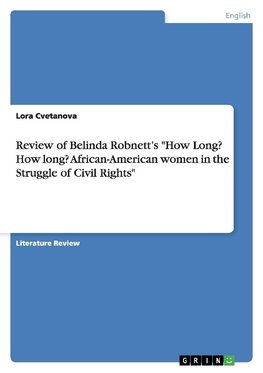
-
 Anglický jazyk
Anglický jazyk
Review of Belinda Robnett's "How Long? How long? African-American women in the Struggle of Civil Rights"
Autor: Lora Cvetanova
Literature Review from the year 2014 in the subject American Studies - Literature, grade: 2, Université Toulouse II - Le Mirail (English Department), course: English Studies: Litearture and Civilization, language: English, abstract: For this study I will... Viac o knihe
Na objednávku, dodanie 2-4 týždne
9.27 €
bežná cena: 10.30 €
O knihe
Literature Review from the year 2014 in the subject American Studies - Literature, grade: 2, Université Toulouse II - Le Mirail (English Department), course: English Studies: Litearture and Civilization, language: English, abstract: For this study I will pay special attention to chapter two: Exclusion, Empowerment, and Partnership where thanks to many oral testimonies from the women themselves, Robnett explores further the relationships among movement participants and thus, offers a critique of black leadership. Here, she examines the role of women in sustaining the 1955 Montgomery Bus Boycott. She correctly attributes the overall success of the 381-day boycott to the infrastructure provided by middle-class women of the Women's Political Council (WPC). She reaches the conclusion that 'what is abundantly clear is that African American women activists did not feel oppressed by their gender. Rather, they experienced feelings of empowerment and were inspired to transcend social constrains imposed by racists institutions and cultural forms (Robnett, chapter 2, page 51).' One of her main arguments is that 'women's status was gained through acts of courage, gender divisions, while quite real, were irrelevant to their day to day struggle to survive as a people'(Robnett, ch2, page 40). Through many quotations of testimonies of women who were actually involved in the movement as leaders (ex. Faye Bellamy , Septema Clark , Dorothy Cotton ) Robnett affirms that 'Women deferred to men was not at issue; the goal was the freedom of Black people and this could be achieved only through a cooperative effort' (Robnett, ch 2, p.43).
The above quote implies that the importance, here is not gender, but freedom. It shows that black people are united and fight for their rights together without posing the question of gender difference. However not once in her work Belinda Robnett talks about the supportive position women had in relation to men in the Montgomery bus boycott. She remind us that 'Though men became the formal leaders of the Montgomery Bus Boycott, it is clear that without the support of the women bridge leaders and the community, their efforts would have proved fruitless.'( Robnett, p. 65). Moreover, thanks to Johnnie Carr's memories, Robnett insists on the fact that women 'took responsibility for the well-being of those who were punished for boycott actions' (p. 66) and 'took responsibility for proving lunches'(p.66). Further in Mrs. Thelma Glass's testimony one notices the repletion of the words ' service and support', 'give what type of services they could give to keep the movement going', 'people have to be fed', 'administrative support'.
- Vydavateľstvo: GRIN Verlag
- Rok vydania: 2014
- Formát: Paperback
- Rozmer: 210 x 148 mm
- Jazyk: Anglický jazyk
- ISBN: 9783656722625




 Nemecký jazyk
Nemecký jazyk 
 Ruský jazyk
Ruský jazyk 




